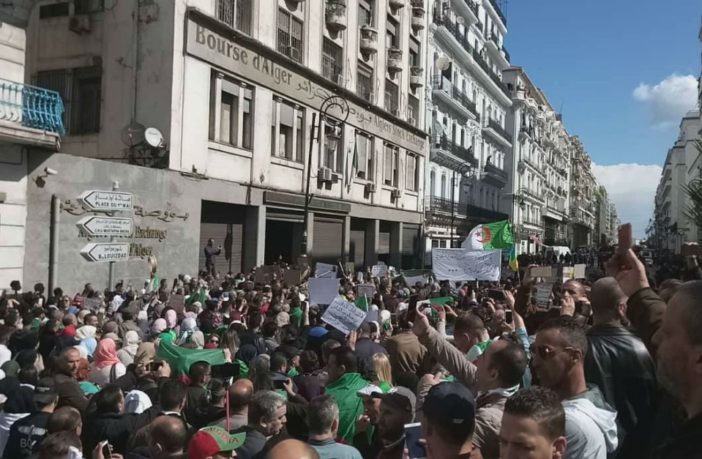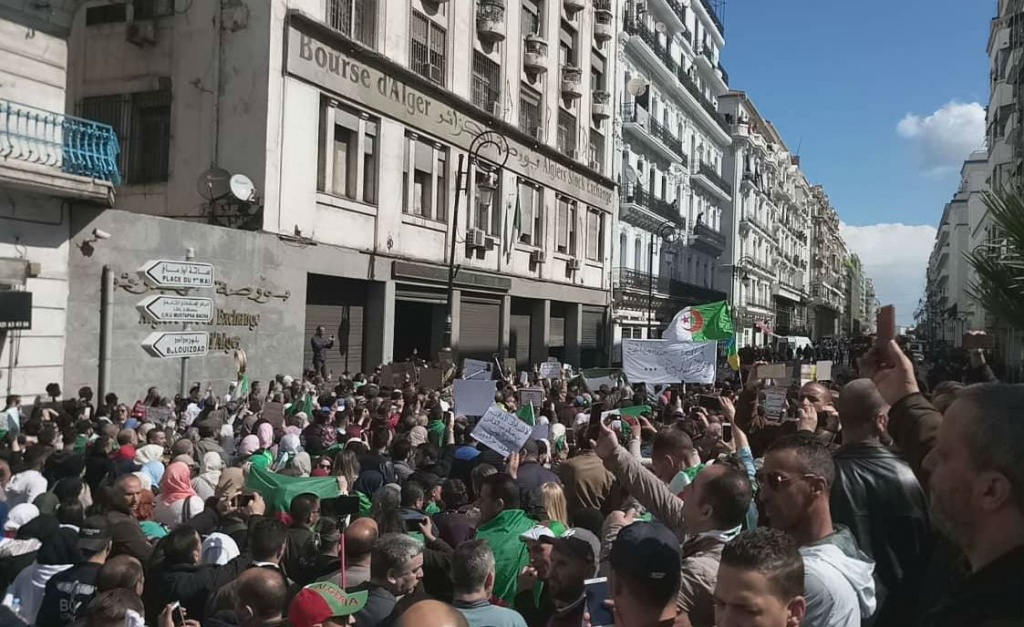Ahram Online
Dina Shehata
The ouster of former presidents Omar Al-Bashir in Sudan and Abdel-Aziz Bouteflika in Algeria after a wave of popular protests in both countries has given rise to speculation about the future of these countries in the light of the recent experiences of other countries in the so-called Arab Spring.
Though many have argued that the protests in Algeria and Sudan will lead either to civil strife and chaos or to renewed authoritarian rule, it is perhaps equally possible that the protests in these two countries may lead to genuine transitions away from authoritarian rule, as happened in Tunisia after 2011.
And while it may seem at first glance that Sudan and Algeria are latecomers to the so-called Arab Spring, it could also be argued that these two countries are in fact decades ahead of the other Arab Spring countries.
Both countries experienced popular upheavals and Islamist political victories coupled with or followed by military interventions in the late 1980s and early 1990s.
So, in some ways they have already experienced their own Arab Springs two decades before the rest of the Arab world and may now be finally transcending the trap of Islamist and/or military rule that has stifled political progress across the Arab world for decades.
In 1989, Sudan experienced a coup led by the military in alliance with the Islamists against the nascent democratic regime led by Al-Sadiq Al-Mahdi. Al-Bashir, representing the military, became president, and Hassan Al-Turabi, representing the Islamists, became speaker of parliament.
The uneasy alliance between the Islamists and the generals continued despite the ouster of Al-Turabi and his imprisonment in 1999.
Al-Bashir’s regime, which was buttressed by support from the military and Islamist groups, was responsible for extended civil strife in the south of Sudan and Darfur and for the ultimate secession of South Sudan.
The regime was also responsible for impoverishing Sudan, providing a safe haven for myriad terrorist organisations and widespread corruption.
In 2019, after Al-Bashir attempted to amend the constitution to further extend his 30-year rule, protests broke out across Sudan led by the federation of professional unions that represents the Sudanese middle class.
After attempts to quell these protests failed, the military deposed Al-Bashir and proposed that an interim military council led by his close associates should replace him. However, the protests continued demanding that Al-Bashir’s associates also be removed from power.
Under popular pressure, the military council duly conceded, and two of Al-Bashir’s top associates were removed. The newly re-configured council then proposed a one-year interim period.
The protesters rejected this proposition and demanded that the interim period be led by a civilian presidential council. Protests and negotiations are continuing over the creation of an interim body that will include civilians and the military and manage the country during an interim period until a new constitution is drafted and elections are held.
Various countries have intervened in attempts to strengthen the hand of the military council vis-à-vis the protesters. However, it appears that the protests will not stop until civilians are integrated in a meaningful way in managing the transition to ensure that neither the Islamists nor the military will again dominate the political process in Sudan.
Algeria experienced widespread popular protests in 1988 against deteriorating social and economic conditions. These protests led the ruling party, the National Liberation Front (FLN), to allow the creation of opposition parties and to convene multi-party elections. In the municipal and national elections held in 1990 and 1991, respectively, the Islamist FIS Party won an electoral majority. This drove the military to dissolve parliament and to disband the FIS.
A series of generals then assumed power in Algeria, and an extended conflict between the military and the Islamists ensued. An estimated 100,000 Algerians died in this conflict.
In 1999, Bouteflika, an old FLN operative, assumed power and was able to consolidate his rule by forging an alliance with the country’s business elite and by pitting different security agencies against one another.
However, Bouteflika’s health has been ailing for a number of years, and it was widely known that his brother and a small band of associates were governing the country behind the scenes.
When it was announced that Bouteflika, despite his ailing health, would run for a fifth term in office, protests broke out across the country. He was deposed after a series of failed attempts to appease the protesters.
A power struggle ensued between the military and Bouteflika’s brother and associates. Ultimately, the latter were arrested. The military is now in charge in Algeria, but the protests continue, and they may mean that the transition to civilian rule will take place quickly and in a meaningful manner.
Conflict and/or cooperation between the Islamists and the generals have long defined the politics of Algeria and Sudan. In the case of Sudan, the long-standing alliance between Al-Bashir and the Islamist groups was responsible for dividing and impoverishing the country.
In the case of Algeria, extended civil strife between the Islamists and the generals entrenched the power of the military and prevented meaningful political, social and economic reform. In both countries, aging leaders buttressed by the military have been attempting to extend their rule indefinitely.
The recent protests in Algeria and Sudan are thus not based on the naive assumption that salvation lies at the hands of the Islamists or the generals. Both societies have become largely disillusioned with Islamist and military rule, and they are ready to move beyond these actors.
In both countries, protesters are insisting on transitional arrangements that will empower civilians and diminish the powers of the military and the Islamists.
However, given the weakness of political elites and civil society organisations such an outcome is not guaranteed.
Unity among the different factions in the opposition on a clear set of transitional arrangements that will guarantee civilian rule is crucial if a successful transition away from authoritarian rule is to succeed in these two countries.
Thus, while a return to military rule or the resurgence of the Islamists cannot be excluded, the recent protests in both countries, driven primarily by secular forces, may provide an opportunity for breaking the trap of Islamist/military rule that has stifled transitions to democracy across the Arab world during recent decades.
*The writer is a senior researcher at Al-Ahram Centre for Political and Strategic Studies.
*A version of this article appears in print in the 16 May, 2019 edition of Al-Ahram Weekly under the headline: Sudan and Algeria: Arab Spring redux?








